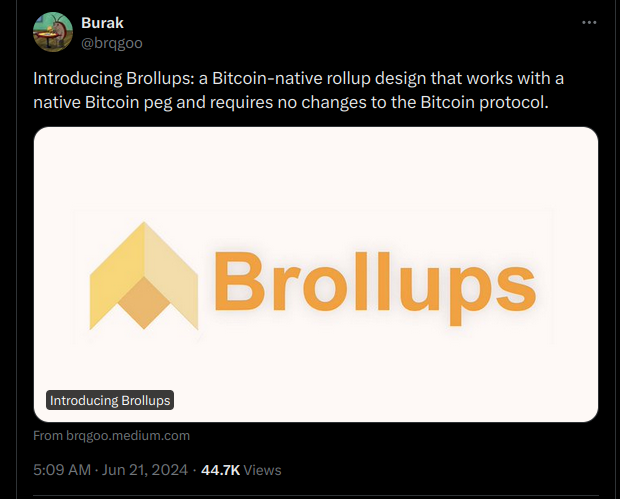Bitcoin Lightning developer Burak unveils design for native BTC Rollup, called Brollups
This covers 90% of DeFi use cases. It's all atomic, verifiable, scalable, and secured on Bitcoin
Brollup is a Bitcoin-native rollup design that works with a native Bitcoin peg and does not require any changes to the Bitcoin protocol. The peg is enforceable on-chain and can be unilaterally redeemed at any time. Brollups are in a category of their own, neither optimistic, ZKP, nor sovereign.
Brollups use the Bitcoin block space as their data availability layer, similar to sovereign rollups. Unlike sovereign rollups, however, Brollups are deeply baked into Bitcoin and work natively with Bitcoin as a payable construct.
A Brollup is operated by an operator or a quorum of operators. Operators provide liquidity to the protocol and advance the rollup state by chaining Bitcoin transactions at regular intervals.
Brollups use the Bitcoin blockchain as the data availability layer, and run transactions on a custom VM known as the Bitcoin Virtual Machine.
Brollups build upon the concept of virtual UTXOs (VTXOs) and utilize them as the peg. However, VTXOs are not actually moved to a separate piece of chain, so-called the Brollup. Brollups simply enable virtual UTXOs to be used in smart contracts as payable constructs.
Brollups are, in short, coinswaps between VTXOs and calldatas.
Like how Ark Network swaps VTXOs for new VTXOs, Brollups swap VTXOs for calldata (plus new VTXOs).
VTXOs are always verifiable off-chain, and enforceable on-chain. Calldata, on the other hand, undergoes client-side validation; Bitcoin clients only see it as bytes, while Brollup clients read and interpret the bytes.
Since calldata is evaluated within the client-side validated context, and VTXOs are verifiable off-chain, a VTXO can be swapped for calldata that executes a payable condition in the smart contract.
Brollups combine calldata with VTXOs to execute payable contract conditions, where, for example, the contract can grant tokens to the msg.sender in exchange for paid Bitcoin, with the location of the payment VTXO derived from the calldata.
This covers >90% of DeFi use-cases, whether it’s listing an NFT for sale in exchange for Bitcoin, where the buyer pays with Bitcoin upon execution, or placing a token sell order on a decentralized exchange, where the filler pays with Bitcoin upon execution. All atomically executed, verifiable, scalable, and enforcable on Bitcoin.






